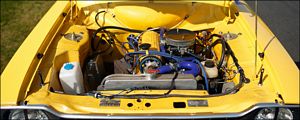|
By accessing/using The Crittenden Automotive Library/CarsAndRacingStuff.com, you signify your agreement with the Terms of Use on our Legal Information page. Our Privacy Policy is also available there. |

Spanner! The Art Of Car Maintenance And Saving Money
|
|---|
|
|
Spanner! The Art Of Car Maintenance And Saving Money
Geoff Maxted
DriveWrite
January 8, 2014
As you know, when you open the bonnet of a modern vehicle, it all looks a bit complicated. It wasn’t always so. If you get the chance, open the lid of an original Mini and you will see just how comparatively straightforward engines used to be. Once, most drivers knew how to attend to basic maintenance or servicing issues and would even attempt more complex jobs - usually successfully.
The modern motorist seems to have forgotten those skills of yore (except of course DriveWrite’s own Artful Bodger who could fix a broken down McLaren MP4-12C with a lump hammer and some electrical tape) as cars have become increasingly and wilfully complex. We prefer to leave it to the professionals with their computer readouts and specialist tools. On the other hand, this is often an expensive exercise and in these days of driving austerity the chance to save some cash seems like an attractive prospect. Is it possible to do at least some of the jobs yourself? I mean, seriously - how hard can it be?
DIY car maintenance is all about common sense. New cars under warranty are probably best left to the dealer as any dodgy tinkering with the works could make a small problem bigger and could also invalidate the warranty. Basic maintenance on older used cars however does make a lot of sense.
If you don’t feel confident to proceed but like the idea in principle then a little training might be just the thing. There are literally hundreds of maintenance courses around the country. Most are organised through local colleges and adult learner schemes. They don’t cost a lot and some candidates may be eligible for financial help. You can also find distance learning courses although it seems better to get your hands oily directly under experienced supervision. For anyone wanting to take it further there are many qualifications available.
The only problem with practical learning of this sort is that the equipment and technology may not be the latest thing, but a spark plug is a spark plug and the basics of the internal combustion engine don’t change that much. The course is likely to be general and won’t deal specifically with your car so it is always a good idea to locate a workshop manual on paper or online that covers your exact needs. (NB: a workshop Manuel is a Spanish car mechanic - don't confuse the two).
A simple service of oil and filter change, spark plugs and air filter will always be beneficial to a car and you will save many pounds in the process. As you learn you will become more confident but don’t get too cocky. It is easy to underestimate the length of time a job will take and this could result in being too hasty. You can always phone a friend.
If you really catch the bug then major works could be undertaken, even engine removal. It’s so much easier to work on these things on the kitchen table in the warm and your spouse or partner will be overjoyed. The family that maintains together stays together. It may still pay to get to know your local mobile technician though.
DIYers need to allow for the cost of tools and parts but with care and due diligence it is possible to drive safely and save money. Probably best not to work on electric cars just yet though. Too many volts can really spoil your day.



















